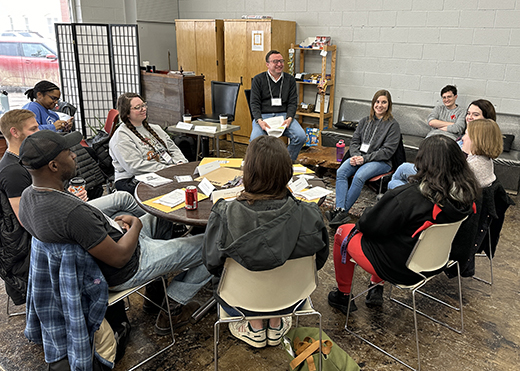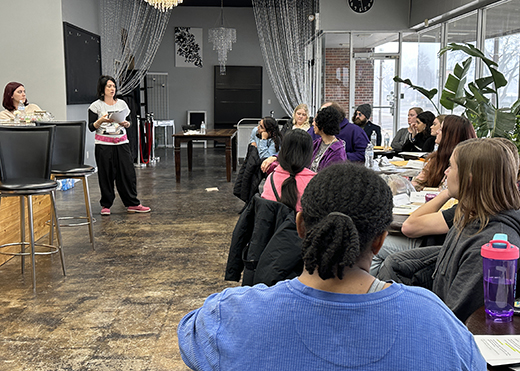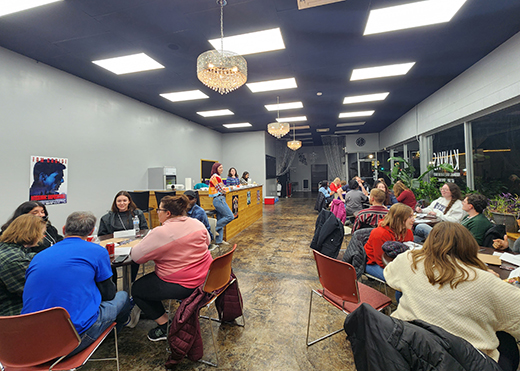How a small-town foodborne illness mystery plays into K-State's effort to boost hands-on student learning
Friday, Dec. 15, 2023

Jason Ackleson, adjunct faculty member in diagnostic medicine and pathobiology at Kansas State University, facilitates a breakout session on the political rise and philosophies of Tony Blair, who was elected prime minister of the United Kingdom shortly after the 1996 Scottish foodborne illness the trip reenacted. | Download this photo.
MANHATTAN — The mystery hung palpably among the group of makeshift Kansas State University public health detectives: Who — or what, precisely — had killed Christopher Shawshank and left scores of other elderly Mansfield pensioners gravely ill?
Could it have been the warm baked bread they had all eaten, improperly handled by a nearby bakery? Perhaps the cold-meat sandwiches had not been sliced and stored correctly at the deli. Maybe the fish and chips, a popular order, had not been cooked to adequate temperatures.
Whatever it was, the team of K-State student investigators was on the case.
This, of course, was not a real "murder" mystery, at least not in this century or even on this continent. It was, however, a reenactment based on a real case of severe foodborne illness that gripped the Scottish countryside in the mid-'90s and left more than a dozen dead.
But even nearly 30 years later and in a small Kansas town, the public health case study proved to be an engaging way to teach students about public health, history and policy, and it's the type of academic experience that is setting apart Kansas State University as a destination for hands-on learning.
For the past 16 years, undergraduate and graduate students at K-State have had dozens of paid-for opportunities to travel around the state and country for experiential learning through the Frontier Field Trip program.
Justin Kastner, a co-director of the program and professor of food safety and security at K-State, said the trips are about helping students grow as academics and well-rounded people.
"That means having some level of joy and fulfillment in what they're studying, and a sense of self-efficacy in knowing they can be competent in solving a problem in their field," Kastner said. "To the extent that students leave a field trip with new friends, a rediscovered joy of learning, and perhaps new knowledge or skills, I think those students are in a better position from a standpoint of being able to grow as scholars."
K-State's Frontier Field Trips meant to give students a look at the world
The trips started in 2007, but the idea dates back three years earlier to when Kastner and Jason Ackleson, a political scientist and adjunct faculty member in diagnostic medicine and pathobiology at K-State, began brainstorming a program that could engage students more deeply in their areas of study while also broadening their horizons.
The first trip took students to nearby Kansas City, Missouri, where they toured underground caverns and learned about storage and historical record preservation. Since then, Kastner, Ackleson and other university faculty have led students on 40 trips to places like the port of Boston, Massachusetts, and the cattle crossings and import/export operations in Santa Teresa, New Mexico.
Washington, D.C., where Ackleson is based, is also a frequent destination, and students often have the opportunity to visit and interact with the Congressional Research Service.
Kastner and Ackleson began the trips by offering three or four each year, although the COVID-19 pandemic slowed that frequency to one or two.
Each trip is designed to include opportunities and experiences in policy, history and skill development. Accordingly, most trips include visits to places like trade ports, policy centers, library archives and other "dynamic venues," Kastner said. Students also typically have literal hands-on opportunities with historic records and other artifacts they might find at those locations.
College field trips help K-State students cross policy, academic frontiers
When they were naming the program, Kastner said he and Ackleson intentionally chose "Frontier" as a play on words with a double meaning. Students learn about actual frontiers in how their areas of study might involve trade and globalization, like food that is imported and exported across international borders.
But more importantly, the name refers to the frontiers that might exist between different academic disciplines, such as between epidemiology and food science or political science and medicine.
"We want students to not only come from different majors and disciplines, but to also think across disciplines," Kastner said. "Maybe they're a science student and they learn something about policymaking. Or if they're a policy-minded student, they learn something about microbiology.
"By helping these students have experiences across these frontiers, I think that makes them not only fall more in love with what they're studying, but also helps them become more scholarly and thoughtful leaders in the real world," Kastner continued.
To date, many of the field trips' students have in fact come from science, technology, engineering and math backgrounds.

Following the resolution of the "microbiological mystery," Valentina Trinetta, associate professor of animal sciences and industry, elaborates on the principles and practicalities of managing the foodborne pathogen E. coli, a strain of which killed 18 people and sickened 500 in Scotland in 1996. | Download this photo.
In Kastner's experience, though, students in those areas of study usually have the most to gain, since they're typically not as steeped in the scholarship of history or policy.
"That's the part I've grown to love the most, in that we might go look at materials in a library, like the history of microbiology, or the history of food safety or the history of mosquito-borne diseases. Having students spend time in an archive just interacting with materials, they learn it can be exciting to learn about the history, and some of the antecedents for what they're doing now."
Margarita Alvarez, junior in food science, Emporia, was one of the students on the December trip. A previous Frontier Field Trip attendee, Alvarez said she has deeply appreciated how the trips broaden her academic horizons.
"It made me more aware of the policies that go into public health crises," she said. "Whenever we broke out into smaller groups, I had a chance to talk with a food science professor, and she explained how some of the major foodborne pathogens spread."
Cross-country trips remind K-State students to find joy in learning
One of the biggest threats to students' joy of learning, or even their ability to succeed academically and graduate, is the risk of burning out, Kastner said.
That's why the program makes sure that most costs, including transportation and lodging, are paid for, typically through state funding and grants.
"That's important for us, because if students can show up knowing it's not anything that they will get graded on and that it's already paid for, they lean forward into it with a sense of relaxation and lack of pressure," Kastner said. "We can't get rid of the pressure that comes with coursework as part of being in a major or graduate program. But we have found that for most students, having this kind of extracurricular experiential learning makes them return to their programs more energized and passionate about their programs."
It's this learning without expectation — without assignments, grades or pressure — that sets the Frontier Field Trips apart as experiences unique to Kansas State University.
"Graduate students, and even undergraduate students, are always overwhelmed with assignments, classes, exams and work," said Chiara Abou Elias, graduate student in food science, Beirut, Lebanon. "Life is always so hectic during the semester. So to be able to have two days away from everything, away from classes and homework assignments, and to instead be able to enjoy a new experience — that's something that students can always look forward to."
In early December, the 40th Frontier Field Trip took a couple dozen students to a hotel and shops in downtown Council Grove, where they participated in the reenactment based on the Scottish foodborne illness outbreak.

Amelia Bresette, senior in food science, Lee's Summit, Missouri, with Kaitlyn Rhine, senior in public health, Cedar Park, Texas, and Chiara Abou Elias, graduate student in food science, Beirut, Lebanon, behind, facilitates a name-that-song social mixer during the 40th Frontier Field Trip to Council Grove earlier in December. | Download this photo.
Students roleplayed as reporters, public health officials and scientists, complete with names like Posh Spice, Robbie Williams and Ethan Hunt to keep with the overall 1990s theme of the weekend.
As the students delved down into the mystery of the foodborne illness's origin, they found the common thread: a local sandwich shop had defied public health orders and sold sandwich meat contaminated with an unspecified, but deadly, pathogen.
Later, Kastner and Ackleson discussed the political and policy ramifications of the real-life case of an E. coli outbreak in Scotland in 1996, which left 18 people dead and led to reforms in food safety education and regulations. Valentina Trinetta, associate professor of animal sciences and industry, also led a discussion on foodborne pathogens, with the assistance of Abou Elias.
Kastner said that although a main focus of the program is to allow students an educational break from their regular coursework, the Frontier Field Trip still gives K-State students the kind of college opportunities that set them apart from other graduates.
The next closest thing would be a paid internship, he said.
"I think we are, in all humility, helping provide one way for students to have an experiential learning experience," Kastner said. "It opens their eyes to possible fields, jobs and careers."
